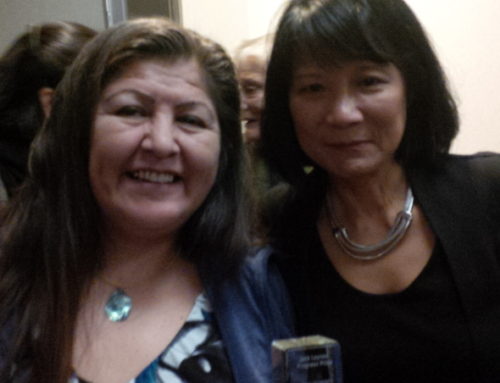Toronto Star: Olivia Chow Gave Green Light for Jack Layton Biopic to Inspire More People to Get Involved
Chow hasn’t seen it yet, but she knows the time is coming soon. She sits in her Chinatown constituency office, a hospitable tray of Chinese custard tarts nearby and a pot of tea for her guest. But her hand shakes and she spills some of it on her desk.
“Oh sure, now you can tell the world Chow doesn’t know how to pour tea!” she laughs, self-mockery her ready defence.
The truth is that it can’t be easy for her to relive those emotionally charged months in 2011 when her husband was diagnosed with prostate cancer, fought it while bringing the NDP to major victory, then succumbed to another cancer in a matter of months, dying at his moment of greatest political triumph.
“I wanted Jack’s story to inspire more people to get involved and try to make the world a better place,” is how she explains her reason for allowing this film to be made so close to the actual events.
But once she had made that decision for more exalted reasons, the ever-practical politician in Chow took over.
“I went and googled Laszlo Barna (the film’s executive producer, who came to Chow with the proposal). I checked out his credits: Céline Dion, Don Cherry, Romeo Dallaire. OK, I’m dealing with a trustworthy professional, so I said, ‘Let’s do it.’”
From that point on, Chow stepped back and let the creative team proceed with their casting.
For Layton, they picked Rick Roberts, a versatile and well-regarded actor best known for his work on series like Republic of Doyle, This isWonderland and Traders.
Roberts, still boyishly handsome at 47, doesn’t look like Layton in real life, a fact that amused his family when he was cast.
“My kids were laughing at the whole idea of me playing Layton, so I took my picture and photoshopped in his hair and his moustache. Then they were convinced.”
Roberts’ resemblance to Layton onscreen is almost uncanny at times, but it didn’t come easily.
“I had to lose 25 pounds and get into shape, because he was. And then I’d spend two hours a day in the makeup chair having my face carefully sculpted so I’d look like him. I wanted to get enough of his voice and his physicality so that I could then make him mine.”
But the external changes were just part of the package.
“You try to put yourself into Layton’s place,” Roberts continues, “but the challenges are so big. What’s it like to have prostate cancer? What’s it like to face an election with all the odds against you? And all the time you’re working on it, you have to keep reminding yourself that you don’t know how it ends.”
For Sook-Yin Lee, the well-known host of CBC’s Definitely Not theOpera and a filmmaker in her own right, playing Chow offered a different set of challenges.
“The physicality wasn’t a problem for me. Olivia would loan us some of her dresses and I could just slip right into them. But the internal life was a lot tougher. She’s an enigma and to get inside her requires some work to fill in the blanks.
“I wound up combining the reality of Olivia with the mythology of Olivia and then adding a little of myself.”
Fact and fiction collided one day when Chow visited the set in Winnipeg. Purely by chance, she arrived when they were about to shoot the hospital scene where Chow has to tell the dying Layton she’s going to bring him home for his final days.
“That was not easy. That was a difficult scene to be there for,” says Chow. But she dealt with it in her own practical way.
“Sook-Yin was wearing a flowered shirt for that scene. I don’t wear flowered things. I like strong, sombre colours. I told them, ‘This is a really stark scene, the shirt should be less cheerful.’”
Chow looks toward the wall. “That was not an easy scene to watch, but I was glad I was there to make sure it was right.”
Lee came to appreciate the many levels of Chow while working on the project.
“There was domestic violence in both our families. We both had tumultuous upbringings, left home and pursued the arts. For Chinese-Canadians that is a very difficult thing to do: break the circle, defy your parents.
“The story of her and Jack is a story of great love and triumph, but also of death and tragedy.”
For Roberts, the immediacy of it all had great power. “We were shooting on the anniversary of his death. The people involved are all still living it, the belief, the grief, the memories.
“It created a merging of reality and art that I’ve never known before.”
Chow has her own plans for closure when the CBC broadcast takes place on March 10.
“I am going to be with Jack’s mom in Florida. And all the brothers and sisters and grandchildren will be there too. We will live-stream it on our laptops and we will share it all together.”
She adds one last thought.
“You know, Jack believed that if you live your life to the fullest at every possible moment, then you’ve got death licked.”




![[VIDEO] Jack Layton Funeral – Steven Page sings Hallelujah](http://rememberingjacklayton.ca/wp-content/uploads/2015/03/Stephen-Page-500x383.jpg)
